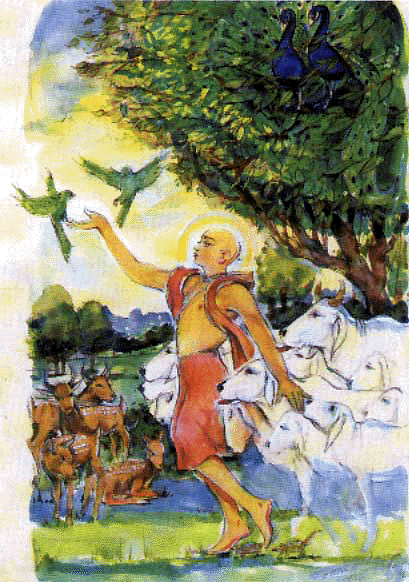
|
|
|
|
BY: SUN STAFF
 Jan 22, 2011 — CANADA (SUN) — An exploration of Sri Caitanya's instructions on renunciation. In our last segment of this series, we were discussing Lord Caitanya Mahaprabhu's instructions on asat-sanga-tyaga, ei vaisnava-acara -- avoiding the association of non-devotees. The neophyte devotee is warned to protect his vulnerable bhakti creeper, not only by taking shelter of other devotees who are practicing Krsna Consciousness, but also by surrounding himself with pure devotees. In his purport to Caitanya-caritamrta, Madhya lila 19.157, Srila Prabhupada explains the importance is remaining under the shelter of the spiritual society he created for the protection of the devotees. In his ISKCON, devotees are to have the association of other like-minded persons as well as the direct association of the pure devotees -- Srila Prabhupada himself and the previous Sampradaya Acaryas. Of course, there is much discussion today amongst the devotees who have found it difficult, if not impossible to remain within the institutional ISKCON after Srila Prabhupada's departure. In the context of asat-sanga-tyaga, that is also addressed in this Madhya 19.157 purport: "Even if one thinks that there are many pseudo devotees or nondevotees in the Krsna Consciousness Society, still one should stick to the Society; if one thinks the Society's members are not pure devotees, one can keep direct company with the spiritual master, and if there is any doubt, one should consult the spiritual master. However, unless one follows the spiritual master's instructions concerning the regulative principles and chanting and hearing the holy name of the Lord, one cannot become a pure devotee. By one's mental concoctions, one falls down. By associating with nondevotees, one breaks the regulative principles and is thereby lost. In the Upadesamrta (2) of Srila Rupa Gosvami, it is said:
"One's devotional service is spoiled when he becomes too entangled in the following six activities: (1) eating more than necessary or collecting more funds than required, (2) overendeavoring for mundane things that are very difficult to attain, (3) talking unnecessarily about mundane subject matters, (4) practicing the scriptural rules and regulations only for the sake of following them and not for the sake of spiritual advancement, or rejecting the rules and regulations of the scriptures and working independently or whimsically, (5) associating with worldly-minded persons who are not interested in Krsna consciousness, and (6) being greedy for mundane achievements."
In his purport, Srila Prabhupada draws a direct connection between asat-sanga-tyaga and the regulative principles: "…if one thinks the Society's members are not pure devotees, one can keep direct company with the spiritual master… However, unless one follows the spiritual master's instructions concerning the regulative principles and chanting and hearing the holy name of the Lord, one cannot become a pure devotee." So although directly associating with the bona fide Spiritual Master alone is sufficient, it must be done in conjunction with sravanam-kirtanam and following the regulative principles. Of course, as we know, "strictly following" is very difficult for the conditioned jiva to do if they don't have the benefit of steady devotee association. During his manifest presence, Srila Prabhupada practically demonstrated the highest standards in all areas of regulated living, and he empowered many of his followers to do likewise. He often pointed to their success in this regard as a means to promote the potency of Krsna Consciousness to other westerners: "And who can chant Hare Krsna unless he is a devotee? Ordinary man cannot chant. He has no taste. But these boys, they are taking my word very seriously. I have asked them to refrain from four kinds of sinful activities: illicit sex, intoxication, meat-eating, and gambling. They are seriously following. They have no illicit sex. Caitanya Mahaprabhu was questioned by a grhastha devotee, "How we can understand a Vaisnava?" So He summarily replied that "Vaisnava, to become Vaisnava perfectly..." Asat-sanga-tyaga ei vaisnava-acara. This is the first principle. Don't associate with asat. Asato ma sad gama. So next line He described who is asat. Asat eka stri-sangi, krsnabhakta ara--finished. In two lines we can understand who is a Vaisnava. So I have asked them. These people, European and American, they are ordinarily very much accustomed to these habit: illicit sex, gambling, meat-eating. But upon my word they have given up everything. Asat-sanga-tyaga ei vaisnava..."
The importance of following the regulative principle with respect to eating only Krsna Prasadam is stated many places throughout sastra, and Srila Prabhupada spoke about it emphatically on so many occasions. There are several pastimes in which Lord Caitanya demonstrated this principle, for example in His avoidance of eating food cooked by the avaisnava Buddhists. We will discuss these pastimes later on. Likewise, Nityananda Prabhu preached that devotees should avoid eating with Mayavadis and sahajiyas, who are asat, materially affected: Caitanya-caritamrta Madhya lila 12.195:
SYNONYMS TRANSLATION PURPORT A Vaisnava, a devotee, should simply discard intimate association with nondevotees. In his Upadesamrta (4), Srila Rupa Gosvami has described the symptoms of intimate relationships in this way:
The words bhunkte bhojayate indicate that one should eat with devotees. One should carefully avoid eating food offered by nondevotees. Indeed, a devotee should be very strict in not accepting food from a nondevotee, especially food prepared in restaurants or hotels or on airplanes. Srila Nityananda Prabhu's reference in this connection is meant to emphasize that one should avoid eating with Mayavadis and covert Mayavadis like the sahajiya Vaisnavas, who are materially affected." The practice of offering foodstuffs to Sri Krsna and taking only His remnants, preferably in the company of other devotees, is but one example of how the regulative principles dovetail with Lord Caitanya's injunction, asat-sanga-tyaga, -- ei vaisnava-acara. In fact, we find a direct correlation between all aspects of nirbanda krishna sambandhe and the practice of avoiding the association of non-devotees. We will begin tomorrow with an erudite statement from Srila Bhaktisiddhanta Saraswati on that point.
| |